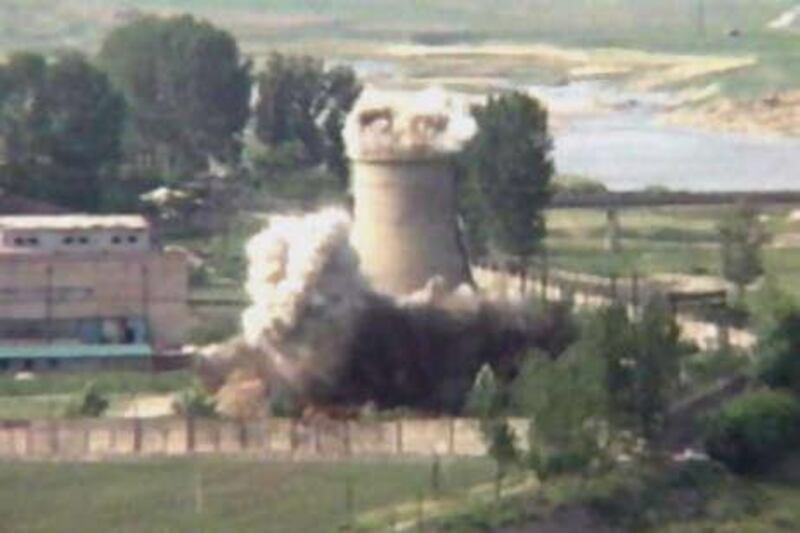SEOUL // Five regional powers will hold talks with North Korea from Thursday on ending its atomic weapons plans and verifying an account the secretive state gave in June of its nuclear programmes, officials said today. The talks, the first in nine months, come after Washington responded to the North's declaration of its nuclear assets by starting to take it off a terrorism blacklist. But Washington also called on Pyongyang to answer lingering questions on proliferation and uranium enrichment.
"We look forward to positive results from this heads of delegation meeting," the Chinese foreign ministry spokesman Qin Gang said when making the announcement for the talks. Hosted by China, they also include the two Koreas, Japan, Russia and the United States. This round of talks is provisionally scheduled to last for three days, Mr Qin said. The South Korean envoy Kim Sook, who had released the date of the talks ahead of China's announcement, told reporters one key issue will be setting a verification mechanism to check claims North Korea made about its murky nuclear weapons programme.
Analysts said North Korea may sign off on an inspection programme but will delay further disarmament steps for as long as possible to squeeze out concessions. "North Korea has no reason to reveal everything it's got," said Park Young-ho, an analyst at the South's Korea Institute for National Unification. "Nuclear armaments are not only North Korea's 'card' to play strategically at the negotiating table, but they are also a tool for Kim Jong-il to stay in power."
The Yonhap news agency reported that the North Korean nuclear envoy Kim Kye-gwan had arrived in Beijing today. In late June, the North presented a long-delayed account of its nuclear weapons programme that contained information on its plutonium production, but did little to address US suspicions of a secret uranium enrichment programme. North Korea, which tested a nuclear device in October 2006, was required in a disarmament-for-aid deal to make the declaration and start taking apart its Soviet-era nuclear plant at Yongbyon by the end of 2007.
It had completed most of the disablement steps by the end of last year. On June 27, in a symbolic move to show its commitment to the deal, the reclusive state invited in media to witness a controlled blast that brought down the cooling tower at its ageing nuclear reactor. In return for these steps, the energy-starved North has received heavy fuel oil aid. Once it is removed from the US terrorism list, the communist state will see an end to sanctions that have mostly cut it off from international banking.
The declaration, however, did not address the North's nuclear weaponry and facilities other than Yongbyon, which may cloud the next round of talks in Beijing. "The US and other players are expecting North Korea to declare and disable other facilities," said Kim Sung-han, a Korea University international relations professor. And there may even be problems with what it did declare because according to reports in Japanese media, the North said it produced about 30 kgs of plutonium while US officials have said they think it is closer to 50 kgs.
*Reuters





